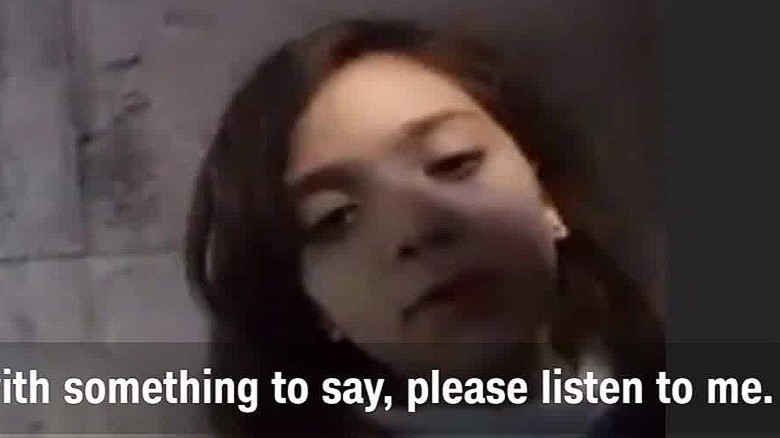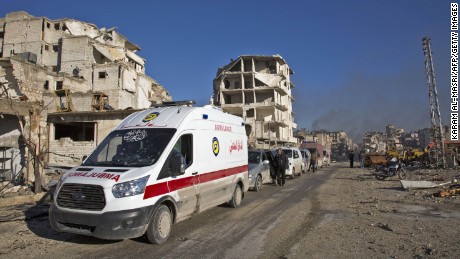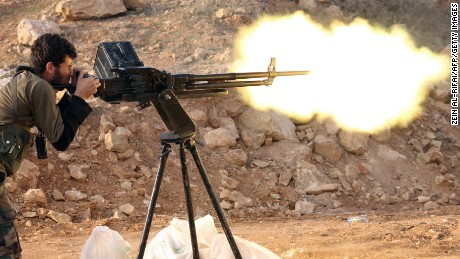Story highlights
- 7-year-old Bana Alabed has become the embodiment of the Syrian war's toll on children
- Her mother speaks to CNN, and tweets as people die around her in regime assault on eastern Aleppo
(CNN)There is nothing harder than being a mother in eastern Aleppo, said Fatemah Alabed.
"You must carry a lot of patience, you must be stronger than anyone in the world," she said. "You must be both a father and a mother, even you must be kid to play with your children to make them feel they are not alone."
Since the conflict began in 2011, the mother of three has watched as her children's lives have been defined by war. Her two boys, Mohammed, 5, and Noor, 3, have known nothing but fighting.
Her eldest, 7-year-old Bana, has become a gap-toothed, pigtailed embodiment of the human toll this grinding conflict has had on the children of Syria.
Three months ago, Alabed, an English teacher with a spotty Internet connection, decided she wanted the world to hear her children's voices and see their faces, hoping that maybe she could galvanize global support and save Aleppo.
She created a Twitter account under Bana's name, tweeting almost daily about their life under siege. Short video clips like the one with Bana standing next to a window praying for the war to stop went viral, although some Twitter users have questioned the authenticity of the account.
"We are sure that the world listen to us, the world listen to the kids," Alabed told CNN on Sunday.
But as the Syrian army Monday captured more districts in eastern Aleppo from rebel fighters, leaving just a handful of districts in rebel hands, she tweeted to inform the world the family was still alive.
Hours later, the account posted a tweet from Bana saying her father had been injured. Additional details weren't immediately available.
An estimated 10,000 people have already fled eastern parts of Aleppo in the last 24 hours. CNN Senior International Correspondent Fred Pleitgen witnessed thousands of civilians walking through the southern front lines, many gaunt with fatigue and malnutrition, as the children among them cried in fear.
In one tweet Monday, Alabed wrote: "Final message - I am very sad no one is helping us in this world, no one is evacuating me & my daughter. Goodbye."
The family also fear regime forces have unjustly targeted them as anti-regime activists.
"I received a lot of threatening messages in Twitter," Alabed said Sunday. "I feel that we are really targeted from regime people, so I can't tell anyone. Even my parents doesn't know where I live."
Bana's family has been in hiding since their home was reduced to rubble on November 27, their location unknown.
Alabed said she decided to speak to CNN to respond to questions and accusations of using Bana as an anti-regime propaganda tool.
"I am still here. I am real," she said. "I am still fighting for my children's life. We are not propaganda. We are real people. We are -- we are Aleppo's people."
When CNN spoke to her on Sunday, Alabed was visibly thinner compared to the last time we spoke in October, exhaustion and stress written all over her face, with black bags under her eyes.
"We don't have enough food, even water, we don't have clean water. We just drink one cup every day," she said. Their daily hunt for food and water is punctuated by the explosions of bombs falling around them.
During the interview, blasts could be heard at times in the background.
Some have cast doubt over the videos Alabed has posted on Twitter, saying Bana appeared to be scripted.
Alabed does not deny helping her young daughter articulate their messages to the world.
The videos are in English so a Western audience can access them, Alabed said. And while her daughter speaks a little English, Alabed helps "to make sure that her voice reach to a lot of people," Alabed said, while holding Bana.
'I love my Syria. I don't want to leave it'
Two months ago, Alabed told us she would never leave eastern Aleppo, but with the regime on the verge of capturing the last of the rebel areas there, she is hoping international aid groups can help evacuate her family to safety.
"I love my Syria. I don't want to leave it, but in these days I don't want to stay in Syria until (it) becomes calm, and because there is still fight(ing). When [the fight finishes] I will come back," she said.
She is too scared to leave with the tens of thousands fleeing to regime-held western Aleppo.
"Maybe they take me, take my husband. Maybe they make us suffering, we see our children killed in front of our eyes. I don't know. There is a lot of idea in my mind, so I afraid to take a chance and go out," she said.
"We are now known and all of the people in regime know our faces and I am afraid to lose one of my kids if I flee with all the people, because they think I work against the regime," Alabed said. "I don't belong to any side ... I was speaking about the Syrian people, about children, especially children here, how they are suffering, how they are living here in east Aleppo.
"We don't want to fight anyone. I (do) not belong to any side, we just want to break the siege and end it and stop the bombing. This is all what we wanted."
Brother too scared to speak
With a big smile, Bana showed off the two baby teeth she just lost.
"There is always bombing. Even at night the bombing is our house," Bana said."We were going to die."
Her baby brother Noor can't speak because of the bombings, Bana said.
Her face lights up when she speaks about her favorite book, Harry Potter.
Last month, author J.K. Rowling, one of Bana's nearly quarter of a million Twitter followers, sent her an e-book as a gift.
"I love Harry Potter. Thank you, my friend J.K. Rowling," Bana said.
Bana's answers in English are short and she waits for help from her mother, so we asked her a few questions in Arabic.
She lists the things she misses in her life. Like any girl her age, she misses her friends, her school, her home that she lost. But with little food left in eastern Aleppo, Bana said she misses fruit. "I like them a lot," she said.
Alabed said despite the risks that came with tweeting and raising her family's profile, she believes she has succeeded in turning attention, even briefly at times, to the suffering of eastern Aleppo's children.
The messages they receive from people all over the world, Alabed said, have given them hope, something to look forward to.
"There is life, maybe, out of besieged Aleppo. Maybe she will get a good life, maybe she will go to school one day, maybe she will play outside in the garden, maybe she will go to the restaurant as she did in the past."

























